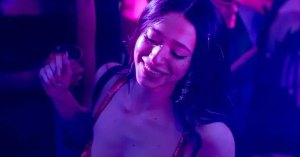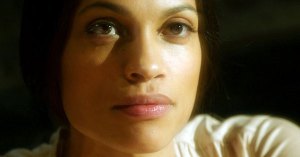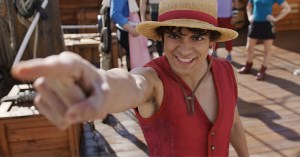Comic-Con 2012: The Art of Frankenweenie
A report from the floor by Josie Campbell, Comic Book Resources
Frankenweenie producers Don Hahn and Allison Abbate stood in the center of Disney’s “The Art of Frankenweenie” exhibit Wednesday at Comic-Con International as journalists and Preview Night attendees walked around, peering at puppets and set pieces from director Tim Burton’s upcoming film.
“It’s no joke that I’ve been standing here all day because I think this is like the inside of Tim Burton’s head!” Hahn laughed as he spoke with Spinoff Online, pointing to the set behind him where the film’s main character Victor had set up a makeshift mad scientist laboratory in his parent’s attic. Hahn smiled at the Victor puppet as he explained he felt the character is a stand-in for Burton. “He’s growing up in Burbank, he got his chance to build his own lab with his mom’s blender and Christmas decorations up in his attic,” he said, “so it’s a little autobiographical. I love it.”
Opening Oct. 5, Frankenweenie is Burton’s 3D black and white stop-motion remake of his own live-action 1984 short of the same name. In the animated film, a young misfit named Victor loses his beloved dog and decides to bring his pet back to life, setting off a chain of events that creates havoc throughout his small town.
“That set is my favorite,” Abbate countered, waving at the school classroom set behind her, where Victor and his fellow puppet classmates sat staring at their teacher.
“I love the puppets so much,” she said. “It’s a really great example of the ensemble cast we have in the movie and how fun and inventive and unique they each are.”
Along with the classroom and attic laboratory sets, the exhibit also features Victor’s kitchen, movie props and “Tim Burton’s Desk,” a display where drawings of the characters and half-finished puppets lay among the director?s notes and scribbles.
“They’re actually sets from the movie,” Hahn said as he pointed around the exhibit. “We didn’t recreate anything — we shipped these over from London.”
The producer behind such animated classics as Disney?s The Lion King and Beauty and the Beast, Hahn told Spinoff that what attracted him to Frankenweenie was the heart of Burton?s original short.
“It’s this wonderful love story about a boy and his dog,” he said. “This movie really spoke to me because it has a heart of gold. It’s what Tim Burton does best. It took me a long time to realize this, but [like] my favorite Tim Burton movies, the Edward Scissorhands-type movies, it’s about a misshapen, misunderstood character with a heart of gold. That’s why this was too good to pass up.”
“And it’s the Frankenstein story!” he added. “How can you go wrong with that?”
The producer said he came to Burton with the idea to expand the original Frankenweenie short into a stop-motion feature film while the director was working on Charlie and the Chocolate Factory.
“I said to him, ‘You had to have had more material here [in the original film]. It’s so much like Frankenstein, and there’s so much to monster movies and there’s so much that you love about this black and white thing,’ and he leapt at the chance,” Hahn recalled.
Besides filming the movie as black and white by building grayscale sets and puppets, Hahn said it was important for them to really capture the animated-by-hand essence of stop motion.
“With Tim as your director you have a very strong creative vision, and Tim wanted to do the film as a stop=motion film in the most traditional sense of the word,” he said. “So if you see the fingerprints and it looks a little choppy that adds to the hand done quality of it, it doesn’t have to be perfect.”
On the subject of stylized animation, Abbate touched upon The Fantastic Mr. Fox, the last stop-motion animation movie she produced, comparing working with director Wes Anderson to working with Burton.
“I think one of the things I love about stop motion is it really is an artist’s medium, so the vision and the sensibility of the director is of paramount importance,” she said. “Wes is so much about the detail and the art direction, and this is very much Tim’s gothic, suburban sensibility.”
Abbate also excitedly pointed to the monster puppets in the display case behind her, explaining that the monsters all reflect the personality of their makers, the kids in Victor’s class.
“For example, Toshiaki makes almost like a Godzilla-like monster, Nassor makes a mummy hamster, the Weird Girl makes her beloved white Persian cat become a vampire,” Abbate explained, adding that one kid went so far as to make monster Sea Monkeys.
“He thinks, how can that go wrong? They’re happy sea monkeys! And then of course they become crazy and mischievous,” Abbate said.
Gesturing to the attic laboratory set once more, Hahn said he hopes the Comic-Con audience takes away from the exhibit how much work went into every part of the stop-motion process, from drawings to the individual hairs on the characters’ heads.
“You can sort of see the process, whereby his drawings go into rough maquettes that maybe are discarded or don’t work, with coffee stains and scribbles on his desk, and you see his creative process and see how that turns into the final set of the movie,” Hahn explained.
“We want you to appreciate the art form,” he said. “It’s a paradox because when you go to see the movie we want you to forget the art form, but as long as we’re here and celebrating the art of animation and comic art, it seems like the right time to share it with everybody.”






